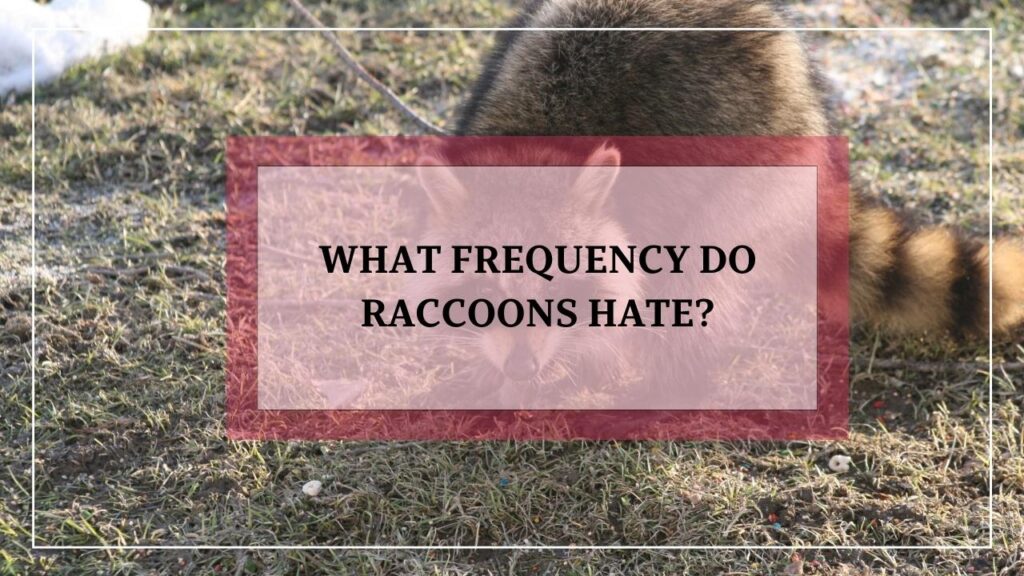Have you ever wondered what frequency raccoons hate? Well, you’re about to find out! Raccoons are clever and mischievous creatures that can be found in many parts of the world. They are known for their mask-like markings on their faces and their bushy tails. While raccoons are generally curious and adaptable animals, certain sounds can really bother them.
These sounds are usually at a high pitch, which means they have a lot of waves or vibrations in a short amount of time. You know how sometimes a loud noise hurts your ears? Well, it’s kind of like that for raccoons, but with specific frequencies. Raccoons are particularly sensitive to ultrasonic sounds, which are very high-pitched noises that humans can’t hear. So, to answer your question, raccoons really don’t like high-frequency sounds, especially ultrasonic ones. These sounds annoy them and make them want to get away from the area where the noise is coming from. Now, let’s dive deeper into why these frequencies bother raccoons and how they can be used to keep them away.
Sensitivity to Sound Frequencies
Raccoons have an acute sense of hearing, which is essential for their survival. They can hear frequencies ranging from 8,000 to 80,000 Hz, surpassing the range that humans can detect. This heightened hearing ability helps raccoons detect the slightest rustling of leaves, the scurrying of prey, or even the approach of potential predators.
While raccoons have an impressive range of frequency perception, there are certain frequencies they dislike. These frequencies can be used to deter raccoons from invading your property and causing a ruckus.
Identifying Frequencies that Raccoons Dislike
Research on raccoon behavior suggests that they have an aversion to high-pitched, ultrasonic frequencies. Ultrasonic frequencies typically range from 20,000 to 100,000 Hz, which is beyond the range of human hearing. These frequencies are often used in devices designed to repel pests, including raccoons.
Related Article:What Plants Do Raccoons Hate
So, if you’re looking to keep raccoons away from your garden or trash cans, ultrasonic devices that emit high-frequency sounds may be an effective solution. These devices work by emitting a continuous or intermittent ultrasonic tone that raccoons find unpleasant, encouraging them to move away from the area.
Repelling Raccoons with Sound
Using ultrasonic devices for raccoon deterrence
Ultrasonic devices can be an effective way to repel raccoons from your property. These devices emit high-frequency sounds that are beyond the range of human hearing but can be irritating to raccoons. The technology works by creating a sonic barrier that raccoons find uncomfortable and will try to avoid.
Explanation of ultrasonic technology
Ultrasonic devices operate by producing sound waves at a frequency above 20,000 hertz, which is the upper limit of human hearing. Raccoons, however, have a more acute sense of hearing and can detect frequencies up to 90,000 hertz. By emitting ultrasonic sounds in this range, you can deter raccoons from entering your property.
Recommended ultrasonic devices for raccoon control
There are various ultrasonic devices available on the market specifically designed for raccoon deterrence. Look for devices that have adjustable frequency settings and a wide coverage range. It’s important to position these devices strategically around your property to maximize their effectiveness.
Natural sound deterrents for raccoons
If you prefer a more DIY approach, there are natural sound deterrents that can also help in keeping raccoons away.
Loud noises and sudden sounds
Raccoons are easily startled by loud noises and sudden sounds. You can use this to your advantage by setting up motion-activated devices that emit unexpected sounds when raccoons approach. This can range from simple objects like wind chimes or aluminum cans tied together, to more sophisticated devices that mimic the sounds of predators or distress calls.
Unpleasant sounds for raccoons
Raccoons have been found to be particularly sensitive to certain sounds that they find unpleasant. These include high-pitched squeals, hissing sounds, and even the noise of a vacuum cleaner. Experiment with different sounds to see which ones work best in your specific situation.
DIY sound deterrents
If you’re feeling crafty, you can create your own sound repellent system using common household items.
Building a homemade sound repellent system
Start by collecting objects that can produce irritating sounds, such as bells, whistles, or even a radio set to a high-pitched station. Attach these items to a string or wire and suspend them around your property, particularly near areas where raccoons are likely to enter.
Related Article:What Do Raccoons Hate But Cats Don’T?
Common household items that emit raccoon-deterring sounds
Get creative with items you already have at home. Empty soda cans with a few pennies inside can create a rattling noise when hung from tree branches or fences. Old wind-up toys or even a strategically placed boombox playing your least favorite music can also help keep raccoons at bay.
Remember, the key to successful raccoon deterrence is to consistently change the sounds you use, as raccoons can eventually become accustomed to certain noises. Mix it up and keep those raccoons guessing!
Now that you know some effective sound deterrent methods, let’s explore other ways to keep raccoons away in the next section.
Other Effective Raccoon Deterrents
Physical barriers and exclusion techniques
When it comes to keeping raccoons out of your property, sometimes you just need to build a wall. Well, maybe not a wall, but a sturdy fence can do the trick. Raccoons are great climbers, so make sure the fence is at least 6 feet tall and extends underground to prevent them from digging under it. And if you want to go the extra mile, consider adding an electric wire on top. It’s like a “keep out” sign, but with a little more shock value.
Another important step is to secure your garbage cans and food sources. Raccoons have a reputation for being dumpster divers, so make sure your trash cans have tight-fitting lids. If possible, store them in a secure shed or garage until trash day. And don’t forget about your pet’s food! Raccoons love a free buffet, so keep pet food indoors or bring it inside at night.
Using scent-based deterrents
Raccoons have a sensitive nose, so why not use it against them? There are certain smells that raccoons can’t stand, like ammonia, garlic, and hot pepper. You can create a DIY repellent spray by mixing these ingredients with water and spraying it around your property. Just make sure you don’t use it on plants or surfaces that could be damaged.
If you prefer a more natural approach, you can use plants like marigolds and mint to deter raccoons. They don’t just make your garden look pretty, but they also emit scents that raccoons find offensive. Plus, they add a lovely touch of color and freshness to your outdoor space.
Professional wildlife control services
Sometimes, despite our best efforts, raccoons just don’t get the message. That’s when it’s time to call in the professionals. Wildlife control experts are trained in dealing with raccoons and other critters, and they have the knowledge and tools to safely and humanely remove them from your property.
When deciding whether to hire a professional, consider factors like the size of the raccoon infestation, the level of damage they have caused, and your own comfort level in dealing with them. Remember, there’s no shame in asking for help when you need it. Plus, it’s a great excuse to avoid any potential raccoon wrestling matches.
Related Article:What Do Raccoons Like
So, there you have it! Some effective methods to keep those pesky raccoons away from your property. Remember, it’s important to find humane ways to deal with wildlife, even if they are a little bit pesky. Coexistence is possible, as long as we take the necessary steps to protect our homes and keep raccoons in their wild habitats.
Now, go forth and raccoon-proof your kingdom! And don’t forget to share your experiences and tips in the comments section below. Together, we can outsmart those crafty critters!
Tips for Coexistence and Prevention
Avoiding Raccoon Attractants
Let’s face it, raccoons are pretty resourceful creatures. They’ll take advantage of any opportunity to scavenge for food or find a cozy spot to call home. But fear not, my friend! There are steps you can take to minimize their interest in your property.
1. Proper Waste Management and Garbage Disposal
Raccoons are notorious for rummaging through trash cans in search of an easy meal. To keep them at bay, make sure your garbage cans have tight-fitting lids. Trust me, raccoons aren’t fans of puzzles, so a secure lid will discourage their late-night feasts.
2. Securing Pet Food and Outdoor Feeding Areas
If you have furry friends that dine outside, be mindful of their food bowls. Raccoons are opportunistic eaters and won’t pass up a free meal. Bring in pet food dishes at night or place them in a secure location to avoid attracting these masked bandits.
Raccoon-Proofing Your Property
Now that we’ve tackled the issue of food, let’s focus on keeping raccoons from turning your property into their personal playground.
1. Sealing Potential Entry Points
Raccoons are skilled climbers and can squeeze through surprisingly small openings. Take a stroll around your property and inspect for any gaps or holes that might serve as an open invitation for these critters. Seal off potential entry points, such as gaps in your attic, crawl spaces, or under decks.
2. Eliminating Potential Denning Sites
Raccoons are notorious for making themselves at home in cozy nooks and crannies. Take a look around your yard for any piles of brush, woodpiles, or abandoned structures that might make an attractive den site. Clear away these potential raccoon hideouts to discourage them from setting up camp on your property.
Remember, prevention is key when it comes to coexisting with raccoons. By implementing these simple measures, you can greatly reduce the likelihood of unwanted raccoon visitors.
Related Article:What Do Raccoons Do To Humans
FAQs
1. What frequency do raccoons hate?
Raccoons are known to have a strong dislike for high-frequency sounds. They are particularly sensitive to frequencies above 20,000 hertz, commonly referred to as ultrasonic frequencies. Ultrasonic devices emitting sounds in this range can be used as a deterrent to keep raccoons away.
2. Can low-frequency sounds deter raccoons?
While raccoons may not hate low-frequency sounds, they are generally less effective in deterring them. Raccoons have a higher sensitivity towards high-frequency sounds. Therefore, using low-frequency sounds alone may not be as effective in deterring raccoons compared to using high-frequency or ultrasonic sounds.
3. Are there any natural frequencies that repel raccoons?
There is no specific natural frequency known to repel raccoons. However, some natural deterrents commonly used to keep raccoons away include ammonia-soaked rags, predator urine (such as from coyotes or foxes), or planting certain plants like mint or marigolds. These methods rely on creating smells or visual cues that raccoons find unpleasant, rather than specific frequencies.
Conclusion
In conclusion, understanding raccoon behavior and their sensitivity to sound frequencies can be helpful in effectively deterring them from your property. Raccoons have an acute sense of hearing and can perceive a wide range of frequencies. While there isn’t a specific frequency that raccoons universally hate, there are certain sounds that they find unpleasant and can be used to repel them.
Ultrasonic devices are a popular choice for raccoon deterrence, emitting high-frequency sounds that are uncomfortable for raccoons. There are various recommended ultrasonic devices available on the market that can be used for raccoon control.
Natural sound deterrents such as loud noises and sudden sounds can also be effective in deterring raccoons. Additionally, certain sounds that raccoons find unpleasant, such as predator calls or distress signals, can be utilized to repel them.
For those who prefer a DIY approach, building a homemade sound repellent system using common household items can be an option. By using items that emit raccoon-deterring sounds, you can create a deterrent system tailored to your needs.
While sound deterrents can be effective, it is important to consider other raccoon control methods as well. Physical barriers, such as fencing, can prevent raccoons from entering certain areas. Securing garbage cans and eliminating food sources can also help deter raccoons.
Related Article:What Do Raccoons Do At Night
Scent-based deterrents can be another effective option, as raccoons have a strong sense of smell and dislike certain odors. Natural repellents and deterrents can be used to create barriers that raccoons will avoid.
If the raccoon problem persists or becomes unmanageable, it may be necessary to seek professional wildlife control services. Licensed wildlife removal experts have the knowledge and tools to safely and effectively remove raccoons from your property.
To prevent raccoon infestations and coexist peacefully, it is important to avoid raccoon attractants. Proper waste management and garbage disposal, as well as securing pet food and outdoor feeding areas, can help reduce raccoon activity.
Raccoon-proofing your property by sealing potential entry points and eliminating potential denning sites can further discourage raccoons from taking up residence.
In conclusion, understanding raccoon behavior and utilizing effective control methods can help ensure a peaceful coexistence with these animals. As always, it is important to prioritize humane methods of raccoon control and to share experiences and tips in the comments section to help others facing similar challenges.

Hi, I’m Ali Tarek, the founder of Animalsman. I’ve always been passionate about pets, especially dogs and cats, and I created this website to share practical tips, easy recipes, and helpful care advice for fellow pet lovers. My goal is to make pet care simple, enjoyable, and accessible for everyone. When I’m not writing or curating content, you’ll usually find me spending time with my furry friends or learning new ways to keep them happy and healthy.



